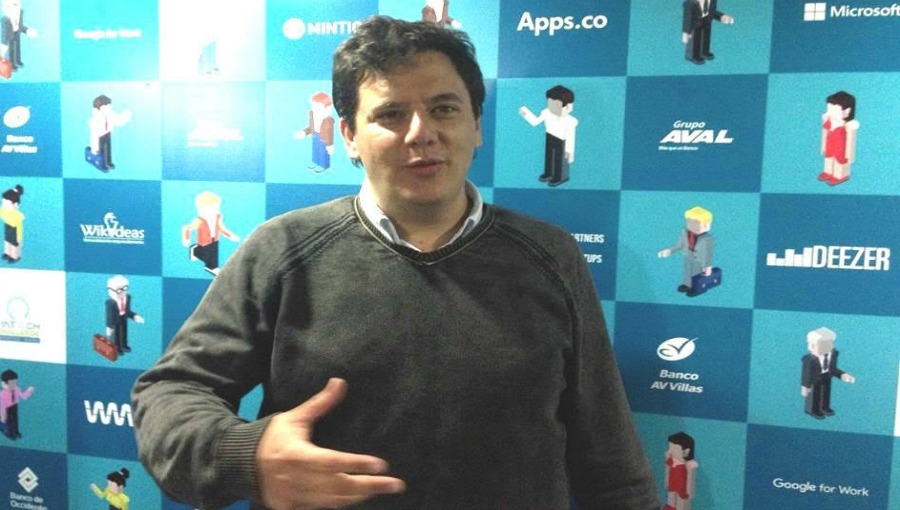High-Tech ‘Startup-Expo’ Trade-Show, Investor Series Launches August 20

High-tech product inventors, computer applications developers, pioneering investors and technophiles will get an opportunity to meet face-to-face August 20 in the first of a series of “Startup Expo” mini-trade-shows organized by local networking group “Aburra Valley,” which describes itself as a “Silicon Valley Paisa.”
In a July 26 interview with Medellin Herald at the “Casa 98” high-tech “co-working space” in the Medellin suburb of Envigado, “Aburra Valley” volunteer leaders Camilo Ramirez (founder of local start-up accelerator Inngenio) and Michel Baron (president of Vitakora, an “internet marketplace” for high-end furniture-and-lighting designers) explained the concept behind the networking group — and the new series of “Startup Expo” shows in and around Medellin.
The first show — featuring high-tech, prototype products and their developers at mini-stands — will be held at “Casa 98” (see map here: www.casa98.co), two blocks from the Jumbo store on Avenida Las Vegas, where parking is available.
At the show, investors, tech developers and others can examine the various products in detail — and talk with the product inventor/developers face-to-face.
Note: Many “Aburra Valley” participants and leaders are conversant in both English and Spanish, so language shouldn’t be a barrier to international participation, Ramirez and Baron pointed out.
(For more information on signing-up for the “Startup Expo” mini-trade-fairs, see this link: http://aburravalley.co/blog/2016/07/24/asiste-a-la-startupexpo/).
Unlike the government-funded “Ruta N” high-tech development center (see “Ruta N a High-Tech Investment Opportunity, but don’t call it a ‘Silicon Valley,’ Medellin Herald, 16 July 2016), “Aburra Valley” is an entirely private-sector, volunteer-driven organization, and it includes five different “coworking” sites for high-tech entrepreneurs, networkers and high-tech investors (both national and international).
Pioneers in the 13-year history of “Aburra Valley” include Jorge Aramburo (an early promoter) and Conrad Egusa, Ramirez explained. The group also proudly cites several of Medellin’s most outstanding high-tech start-ups that have since mushroomed into multinational players, including Intergrupo (founded by Dario Solarzano), Choucair Testing (founded by Maria Clara Choucair) and Ilimitada (founded by Juan Jose Mejia), Ramirez said.
Other notably successful Medellin-based high-tech start-ups touting more than a decade of growth here and/or internationally include PSL, DVS Systems Security, and start-up incubator Creame, he added.
What most separates “Aburra Valley” from the similarly high-tech, investor-oriented Ruta N is informality, as Ramirez and Baron explained here. Ruta N includes big office towers and an institutional framework, whereas “Aburra Valley” is a volunteer network operating in smaller, reconfigured houses that resemble hostals.
Some 1,500 entrepreneurs are linked to the “Aburra Valley” group, along with some 4,000 technologists, they said. A relatively small subset of these groups may rent offices at any of the five “co-working” spaces around Medellin. Also, typically about 40 to 60 of these entrepreneurs and “techies” will attend the fortnightly “meet-up” networking events featuring expert speakers, angel investors, “pitch” counselors and others.
The “co-working” spaces in Medellin neighborhoods include Calasanz, El Poblado, San Diego and Laureles, while Envigado has two other sites, they said.
Start-ups that occupy offices in these local co-working spaces pay monthly rent, which covers the cost of maintaining the spaces. Renters not only enjoy high-tech infrastructure, but also benefit from personal feedback on their proposed products and inventions.
IT Resources Likely to Expand
While a recent study cosponsored by JP Morgan, Endeavor and Corporacion Las Mercedes found that Colombia would lack some 93,000 trained IT professionals by 2018 — a potential road-block to more high-tech start-ups here — solutions to this problem are arising, Ramirez pointed out.
For one: Colombia’s Ministry of Technology (Min-TIC) has budgeted some US$100 million for targeted loans administered by ICETEX for students pursuing information technology (IT) careers. In addition, local “boot-camps” such as those developed and run by Medellin-based World Tech Makers (see: https://worldtechmakers.com/) are enabling rapid training of the next generation of IT programmers. Some of the graduates will pursue relatively high-paying tech jobs — and might earn equity shares in start-ups, or even become their own entrepreneurs, he said.
Internet on-line courses are also emerging for self-teaching in computer programming, he added. Together, these university, “boot-camp” and self-teaching resources are likely to help close the foreseen gap in supply of IT professionals in coming years, he said.
















